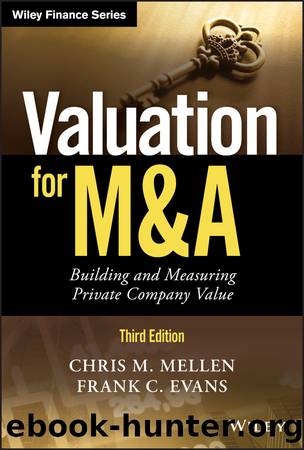Valuation for M&A by Chris M. Mellen & Frank C. Evans

Author:Chris M. Mellen & Frank C. Evans [Mellen, Chris M. & Evans, Frank C.]
Language: eng
Format: epub
ISBN: 9781119437383
Publisher: Wiley
Published: 2018-05-22T00:00:00+00:00
Private companies often are heavily dependent on key owners and/or executives who possess unique knowledge, contacts, or skills that materially contribute to the company's success. Although these factors reflect positively on the owner's contribution to the company, they can be a negative in the exit planning process. Buyers would generally be reluctant to acquire a company whose performance is highly dependent on the owner and a few key people unless it is certain that those people will stay with the company at least for a specified period of time after a sale. This can lead to the sad circumstance of the owner planning to sell his business and retire in five years only to find himself four and half years into this process realizing that he can get a good price for the company only by agreeing to work for three more years after the sale. Had he realized this five years earlier, he could have begun to work on building a management team that is available to replace him when the future sale takes place.
One or more other factors are commonly present that complicate any exit plan. The first is stock transfer restrictions in the company's bylaws or shareholder agreements. These commonly exist to prevent unwanted individuals or entities from obtaining an ownership interest in the company. Although such provisions provide protection, they can sharply limit or virtually eliminate a shareholder's ability to sell his stock. These restrictions alone make annual review of bylaws and shareholder agreements in a private company an absolute necessity.
When there are multiple shareholders in a private company, shareholder restrictions can be further complicated by the needs and goals of the other shareholders. Some may oppose any change in ownership or lack the financial means to acquire any shares offered for sale. Others may oppose the company acquiring shares through a recapitalization and may use an individual shareholder's desire to sell stock to extract a lower price or other concessions from him. Other shareholders may have no involvement in the company or even no knowledge of it or of their investment.
Timing a private company sale can also be a challenge. The shareholder who wants to leave in three or five years may find that, when that date finally arrives, the company or industry conditions have weakened substantially, greatly reducing the sale price. Others who are ready to sell may find that they face restrictions from supplier agreements or demands from customers that make exiting difficult except under adverse price and terms.
The exit planning process cannot be approached solely from a financial perspective. Assessing an owner's mental readiness to exit is as, if not more, important.
Download
This site does not store any files on its server. We only index and link to content provided by other sites. Please contact the content providers to delete copyright contents if any and email us, we'll remove relevant links or contents immediately.
| Private Equity | Valuation |
| Venture Capital |
The Black Swan by Nassim Nicholas Taleb(6191)
Bad Blood by John Carreyrou(5769)
Pioneering Portfolio Management by David F. Swensen(5606)
Millionaire: The Philanderer, Gambler, and Duelist Who Invented Modern Finance by Janet Gleeson(3569)
Skin in the Game by Nassim Nicholas Taleb(3460)
The Money Culture by Michael Lewis(3284)
Skin in the Game: Hidden Asymmetries in Daily Life by Nassim Nicholas Taleb(3264)
Bullshit Jobs by David Graeber(3180)
The Wisdom of Finance by Mihir Desai(3078)
Blockchain Basics by Daniel Drescher(2891)
Liar's Poker by Michael Lewis(2812)
The Intelligent Investor by Benjamin Graham Jason Zweig(2596)
Hands-On Machine Learning for Algorithmic Trading by Stefan Jansen(2518)
Mastering Bitcoin: Programming the Open Blockchain by Andreas M. Antonopoulos(2511)
Investing For Dummies by Eric Tyson(2470)
Fooled by Randomness: The Hidden Role of Chance in Life and in the Markets by Nassim Nicholas Taleb(2413)
The Power of Broke by Daymond John(2376)
Zero Hour by Harry S. Dent Jr. & Andrew Pancholi(2246)
Market Wizards by Jack D. Schwager(2163)
